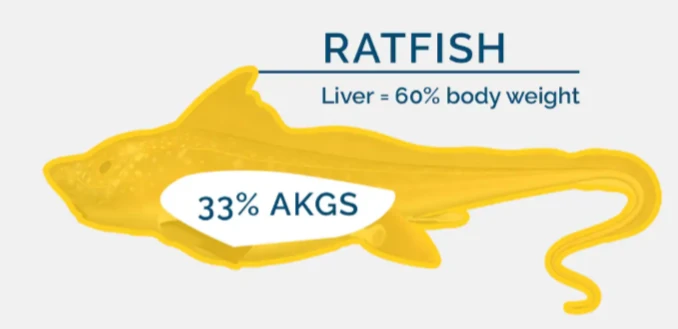Recipe: How to make fermented ratfish liver oil?

The ratfish, a little-known group of shark relatives (known also as rabbit fish), has been a source of nutritious oil for centuries – especially in Scandinavian countries.
This oil, known as ratfish liver oil (RLO) is rich in vitamins A and D, omega fatty acids, and alkylglycerols, making it a valuable supplement for maintaining healthy cholesterol levels, heart health, and skin. [2].
Now, although you can purchase ratfish olive oil online and avoid getting your hands dirty, you will not find fermented ratfish liver oil that easily because of the extra step and significant time the fermentation process adds to the end product.
we’ll guide you through the process of creating your own fermented ratfish liver oil.
Keep in mind that making fermented ratfish liver oil is a challenging task. You first need to find ratfish livers either by purchasing or fishing.
After you obtain them, the livers must be handled gently to avoid bruising, which can lower the quality of the oil produced. Additionally, the extraction process must be carried out as soon as possible after harvesting to avoid any chemical changes.
So without further delay’s here’s a step-by-step guide on how to make fermented ratfish liver oil:

Fermented ratfish liver oil
Equipment
- 2 Glass jar with a tight-fitting lid
- 1 Fine-mesh sieve or cheesecloth
Instructions
- Thoroughly rinse the ratfish livers under cold water to remove any impurities
- Sprinkle sea salt over the livers, ensuring that they are evenly coated
- Transfer the salted livers into a glass jar, making sure to pack them tightly
- Seal the jar with a tight-fitting lid and place it in a cool, dark place for at least six months
- After six months, strain the fermented oil from the livers using a fine-mesh sieve or cheesecloth
- Discard the livers and transfer the oil into a clean glass bottle for storage
Notes
- To benefit from fermented ratfish liver oil, take one teaspoon daily with a meal.
- For those who prefer, it can be mixed with juice or water to mask the taste.
- To nourish and moisturize the skin, apply a small amount directly.
- Fermented ratfish liver oil is a natural remedy for dry skin, eczema, and psoriasis.
Fermented Ratfish Liver Oil vs Non-fermented RLO
What’s the difference between fermented Ratfish Liver Oil and Non-fermented RLO?
The main difference between fermented Ratfish Liver Oil and non-fermented RLO is the fermentation process. Fermented Ratfish Liver Oil undergoes a fermentation process which involves the breakdown of organic compounds by microorganisms such as bacteria or yeast.
You essentially ferment ratfish liver first and then you extract it’s oil.
Non-fermented Ratfish Liver Oil, on the other hand, is taken directly from the liver of the Ratfish without undergoing any fermentation process. It is typically processed and purified to remove impurities.

The fermentation process enhances the nutrient content and bioavailability of the oil, while non-fermented RLO is produced without this step.
Fermented Ratfish Liver Oil can lead to changes in its nutrient content. For example, fermentation can increase the concentration of certain beneficial compounds such as bioactive peptides, antioxidants, and probiotics.
It can also contain higher levels of vitamin K2 and other beneficial compounds.
However, the specific nutrient content and health benefits of fermented and non-fermented RLO may vary depending on the production methods and quality of the oil.
Fermented Ratfish Liver Oil may also have a “stronger” taste and smell because of the fermentation process.
Non-fermented Ratfish Liver Oil is more readily available and commonly found in the market compared to fermented RLO. The fermentation process adds an extra step and time to the production process, which can increase the cost of the final product.
Ratfish Liver Oil Benefits
Ratfish liver oil, derived from the liver of the ratfish (Chimaera monstrosa), is believed to offer several health benefits. Here are some of the key benefits associated with ratfish liver oil:
- Supports Healthy Cholesterol Levels, Heart Health, and Skin: Ratfish liver oil is known to support healthy cholesterol levels, heart health, and skin. It is considered to be a rich source of naturally occurring fatty acids, fat-soluble nutrients, and antioxidants .
- Immune System Support: The oil contains natural alkylglycerols, which have anti-inflammatory properties that may help support overall immune system health. This has been a major reason why Norwegian Vikings named it the “Gold of the Ocean” and used it to keep their immune system strong and healthy .
- Anti-Inflammatory and Inhibits Free Radical Damage: Ratfish liver oil may ease inflammation and inhibit free radical damage. It is also known to have remarkable anti-inflammatory qualities and has been shown to stimulate the immune system .
- Supports the Pineal Gland and May Ease Inflammation: Ratfish liver oil is believed to support the pineal gland, may ease inflammation, and inhibit free radical damage. It is also known to lubricate, protect, and de-calcify demanding surfaces and systems .
- Rich in Nutrients: Ratfish liver oil is a good naturally occurring source of various vitamins and nutrients, including Vitamin A and Vitamin D. It is also naturally high in Vitamin E, which provides nutritional benefits and acts as a natural preservative of the oil .
Final Words
So there you have it. A fermented ratfish liver oil recipe. Let us know if you have already put it to the test. Send us a picture if you like with the process. We would be honored to include in the blog.
In the meantime, check some more fermented recipes for fermentation lovers.
